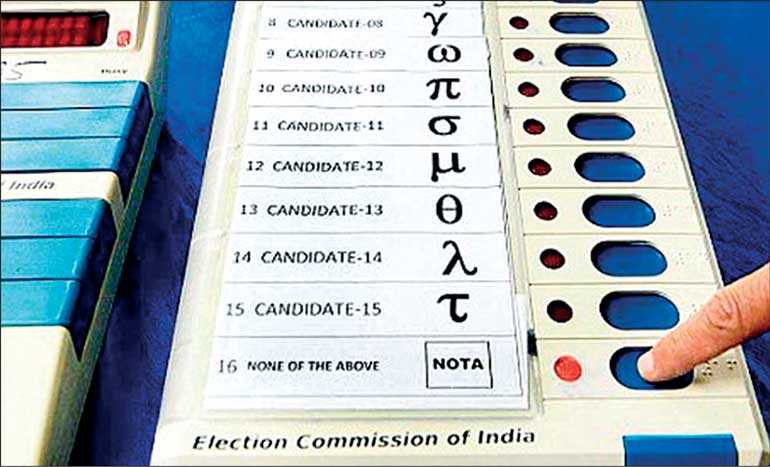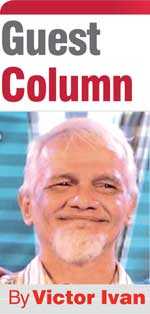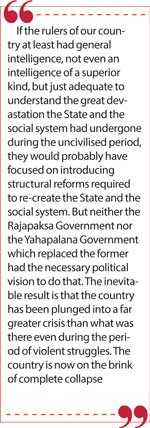Friday Feb 20, 2026
Friday Feb 20, 2026
Friday, 20 September 2019 00:00 - - {{hitsCtrl.values.hits}}

The Presidential Election is round the corner, but the public is still confused about the powers of the next president. 
It can be said that the 19th Amendment has made a significant change in the system of governance despite the fact that it had been passed in a manner most ugly and unscrupulous. More than four years have passed since the amendment was passed, yet not only the public, even the politicians themselves are not fully aware of the changes it has made on the system of governance.
The most responsible for this unfortunate situation is the academia of political science. They ought to have explained and enlightened the public of the changes that came over the system of governance consequent to the 19th Amendment. Regrettably they remained silent and did nothing to enlighten the people.
Whether it was due to the fact that they themselves did not have a proper understanding of the impact of the 19th Amendment or whether they were simply not interested in acting responsibly in this regard is not clear.This is an unfortunate situation that prevails not only in the political arena but also in almost every other field in Sri Lanka.
There was a rapid increase in superstitions among the people during the period of violent conflicts. This trend continued unabated even after the internal civil war was over as the media had begun to make a business out of popular superstitions of the people. Today, it has become a fashion for students sitting for examinations to write with pens claimed to have been charmed with supernatural powers. While this tendency is continuing, causing enormous damage to society, it is pathetic that except for a few academics in the science field, there are none who think it is their responsibility to make a change in this situation.
Sri Lanka has plunged into a miserable state not only because of the politicians. The failure of the academia of Sri Lanka in playing an effective role to promote social intelligence and thinking of the public can also be considered an important factor underlying the backwardness of the country. It is time that the academia thought of this situation seriously and came forward to arrest this trend.
Historical heritage
Perhaps historical reasons too might have influenced the poor vision of Sri Lanka’s society, particularly on the philosophy of democracy. I feel it is important to consider this historical background briefly as a prelude to the review of the current debate on the Presidential Election, the theme of this article.
If one looks at the books written during the long history of Sri Lanka prior to the advent of the British and the country being made a British colony, it is possible to realise that the people of our country did not know about great thinkers and philosophers other than the Lord Buddha, who had lived during the Buddhist period and thereafter. All the books written during this period were religious in content. Not a single book on science, about the nature of the world or human nature had been written in Sri Lanka during this long period.
Ancient Sri Lankan society was unaware of the origin and spread of the concept of modern democracy. So much so that Sri Lanka was uninformed of the Magna Carta, the great Charter of the Liberties, one of the most famous documents in the world signed in 1213 in Britain. It was at the time when Kalinga Magha invaded Sri Lanka.
It was during this period that the Sinhala people migrated to the wet zone and the Tamils to the north, leaving the Raja Rata or the dry zone civilisation. Sri Lanka was also ignorant of people’s mass uprisings against the feudal system in Europe in the 18th century. They were not aware of the American Revolution of 1765-1783 or the French Revolution of 1784-1797. Sri Lanka came to know of these upheavals that changed world history only 100 years after the events.
The collapse of the feudal system or the monarchy of Sri Lanka was not an outcome of mass uprisings but a direct result of the British colonialism. Although there were many political movements, including the Sri Lanka Jathika Sangamaya, operating in the country when the Donoughmore Commission arrived in Sri Lanka in 1927, the observation of the said commission was that none of these movements were democratic movements. Unlike in India, the freedom movements of Sri Lanka have not been able to bequeath liberal values to society.
Although there was no United Nations Organization at that time, the Indian freedom movement had an advanced Human Rights Charter. But the Sinhala, Tamil and Muslim leaders of Sri Lanka’s freedom movements did not have a clear understanding at least about the concept of human rights. That is why the differences between the Sinhala and Tamil people were unable to be resolved at the initial stage without letting them to grow into mutually-destructive conflicts.
Marxist legacy
The distortions that can result in a society of feudal-minded people lacking democratic discipline are immense when Marxism is introduced to them suddenly. While the Marxists of India joined hands with the Gandhian movement and made a strong effort to build a modern nation, the Marxists in Sri Lanka were concerned with the building of the working class. They perceived the democratic institutions that had been emerging in Sri Lanka as capitalistic nonsense. Instead they dreamed of building a proletarian dictatorship.
Not a single book of classical liberal thinkers had been translated into Sinhala. Instead, a large number of books of theorists such as Marx, Engels, Lenin and Mao Tse Tung had been translated into Sinhala and there was a program in operation to socialise them in bulk, free of charge or at a nominal price. In the end, the rural youth of Sri Lanka knew to recite the Russian Revolution and the Chinese Revolution by heart. Thus, they only knew about socialist revolutions in the world. They did not have any knowledge of the English, American or French revolutions. They viewed Gandhi’s independence movement in India contemptuously.
Not only Wijeweera, even Prabaharan held Subhas Chandra Bose, not Gandhi of the Indian independence movement, in high esteem. Wijeweera appeared for a socialist state. Prabaharan also appeared, initially, for a socialist Eelam.
The factors such as race, caste and religion had an impact on Sinhalese and Tamils insurgencies in Sri Lanka. Had Sri Lanka succeeded in building the modern nation, perhaps these rebellions would not have arisen. Sri Lanka failed to foresee the need for building a modern nation because, unlike India, Sri Lanka did not have a broad political vision. The violent clashes and the uncivilised atmosphere prevailed in our country for over a very long period as a result thereof, and further confused and weakened the feeble political imagination of Sri Lanka.
If the rulers of our country at least had general intelligence, not even an intelligence of a superior kind, but just adequate to understand the great devastation the State and the social system had undergone during the uncivilised period, they would probably have focused on introducing structural reforms required to re-create the State and the social system. But neither the Rajapaksa Government nor the Yahapalana Government which replaced the former had the necessary political vision to do that. The inevitable result is that the country has been plunged into a far greater crisis than what was there even during the period of violent struggles. The country is now on the brink of complete collapse.
The Presidential Election going to be held in November is the third since ending the internal civil war. The time that has elapsed with no attempts to bring about structural reformations is 10 long years. Sri Lanka is now in a state of near collapse. The State and its institutional system is in a state of rampant inefficiency and corruption. The social system is in a state of chaos. Economically too, the country is in a vulnerable situation which can lead to bankruptcy at any moment.
But there is hardly any serious mention about the reality of the crisis and how the country should recover from it in the dialogue on the forthcoming Presidential Election. Everyone talks about religion and Dasaraja Dharma and patronage envisaged to be extended to temples, churches and mosques.
Those who advocate various alternative movements speak of corruption, but do not say anything about how they expect to reorganise the State, or how to solve the problem of race, caste and religion the country is facing.
Appropriating false power to presidency
The most ridiculous thing is that no one is talking about the real truth of the nature of the powers of the next president. The naked truth is that the next president will not have even as much powers as incumbent President Maithripala Sirisena, let alone comparing to powers exercised by late President J.R. Jayewardene. But all hopefuls and contestants of the Presidential Election have been compelled to show off to their supporters that they are contesting for an all-powerful position to keep their enthusiasm at a higher level.
They cite Article 30(1) of the Constitution in justifying their claim. It states: “There shall be a President of the Republic of Sri Lanka, who is the Head of the State, the Head of the Executive and of the Government, and the Commander-in-Chief of the Armed Forces.”
When the above excerpt is shown to a person who has no knowledge of the subject of the Constitution, he or she might tend to feel that the next president has an enormous power.
But, it is important to note that the powers of William Gopallawa, the President from 1972 to 1977, who was a nominal president, had been specified in the first Republican Constitution of 1972, in a similar way.
Articles 19 and 20 of the first Republican Constitution 1972 are similar to Article 30(1) of the present Constitution quoted earlier, which read as follows.
Article 19: There shall be a President of the Republic of Sri Lanka who is the Head of the State.
Article 20: The President is the Head of the Executive and the Commander-in-Chief of the armed forces.
The second excerpt from the 1972 Constitution produced above had given President William Gopallawa of the Republican Constitution a big impression about his powers, but he was only a nominal President acting on the recommendations of the Prime Minister. The position of the next president is much the same.The only difference is that William Gopallawa was nominated by the Prime Minister as President while the next president will be elected by a public vote. The election by public vote will not confer on the next president powers that are not specified and mandated in the Constitution.
The most important change that will take place would be the transformation of the existing presidential system of governance into a parliamentary system of governance from the moment the next president is sworn in. Then onwards, it is the manifesto, the policies and programs of the political party which commands majority power in the Parliament that will be implemented.
The next question that arises is that the powers held by the executive presidents previously are vested in a Parliament which is corrupt, inefficient and ineffective and the structural reforms required for rectification of the corrupt situation have not been effected. Therefore, the transfer of power structure will not result in a healthy change for promoting good governance.
Push for reforms
The damage caused to the country can be enormous in an atmosphere where essential reforms are evaded persistently. Perhaps this situation may plunge Sri Lanka into a state of utter misery from which it may not recover for a long time. Whoever comes to power in the next Presidential Election, the situation of the country will not change.
In this backdrop the informed people of the country should take initiative seriously about the need and the importance of effecting structural reforms. Under the circumstances, would it be possible to turn this Presidential Election into an opportunity to push the country towards that end?
NOTA – ‘None Of The Above’
A case has already been filed in the Appeal Court seeking approval for inserting a cage for ‘NOTA’ on the ballot paper. NOTA stand for ‘None Of The Above’. It is a system or an option that could be used to reject all the candidates contesting elections or to express protest against them and mark the voter’s preference in the cage allocated for NOTA. The vote cast for NOTA is considered a valid vote and counted at the end.
In India, the NOTA option was introduced in 2013, following an order issued by the Supreme Court of India to the Election Commission of India (ECI) in consideration of a public litigation petition filed by The People’s Union for Civil Liberties, an NGO. Use of the right to vote is one way of exercising the sovereignty of the people. In Sri Lanka, it can be considered the only way available to exercise the sovereignty of citizens. It is an option granted to the voters to express their preference when they feel none of the candidates are qualified to be voted for. The NOTA option can be used to express protest against the political system as well.
In addition to India, this system is being implemented in several other countries like Russia, Greece, Ukraine, Spain, North Korea, Colombia and Bangladesh. In the 1991 election in Russia held for electing members for the Legislature, the people of Russia used the NOTA option effectively to defeat powerful leaders of the Communist regime who contested for about 50 constituencies
No other candidates contested the constituencies which were represented by powerful leaders of the Communist regime. It was later revealed that it was not a mere accident that no other candidates had contested but an outcome of an organised plan in which the public organisations had prevented the candidates from contesting those constituencies.
Even in the absence of other candidates to compete against them, the powerful members of the Communist regime were not allowed to be elected uncontested because of the NOTA option granted to the voters. The voters were able to make the NOTA win. In this context, Russia was compelled to hold fresh elections for each constituency where NOTA had polled the majority of votes, preventing the defeated candidates from re-contesting the election.
Commenting on the results of this election, Russia’s President Boris Yeltsin commented that, in spite of the corrupt electoral system, the Russian people had been intelligent enough to use the NOTA option to defeat the powerful candidates who deserved to be defeated.
A similar incident took place in the city of Makassar, Indonesia in an election held to select the Mayor of the city. In this instance, the NOTA cage was able to garner more votes than the votes polled for the actual candidates. This situation rendered it necessary to hold a re-election.
If the number of votes polled on NOTA is insignificant, it cannot make a drastic or transformative effect. But the impact that NOTA can have is extremely revolutionary when it reaches the first or the second place.
Mr. NOTA
Following the case filed by us in the Appeal Court, if the Judiciary grants approval for inserting a slot for NOTA in the ballot paper, even if there is no physical entity as NOTA, it will automatically become a candidate for the Presidential Election. Even in the absence of a physical entity, as it becomes a contestant, it is appropite to call it Mr. NOTA rather than calling this important option just NOTA.
Mr. NOTA has no religion, caste, creed, ethnicity or sex. Therefore everone can rally round Mr. NOTA without any bias or discrimination.
If everyone who wishes to see that recognition of ethnic, religious and caste discriminations and segregations are eliminated, everyone who wishes to see that the corruption that has overwhelmed the country is removed, everyone who wishes to make a wholesome change in their careers and means of living, everyone who wishes to see a deep and far-reaching change in the political and social system is prepared to utilise the NOTA option and make NOTA win in expectation of winning a people’s constitution which could be used for effecting a far-reaching change in the system, or using the vote in another appropriate manner, and contribute to make the votes polled for NOTA number 1 or 2, undoubtedly, it will become a significant turning point of a great change in Sri Lanka.